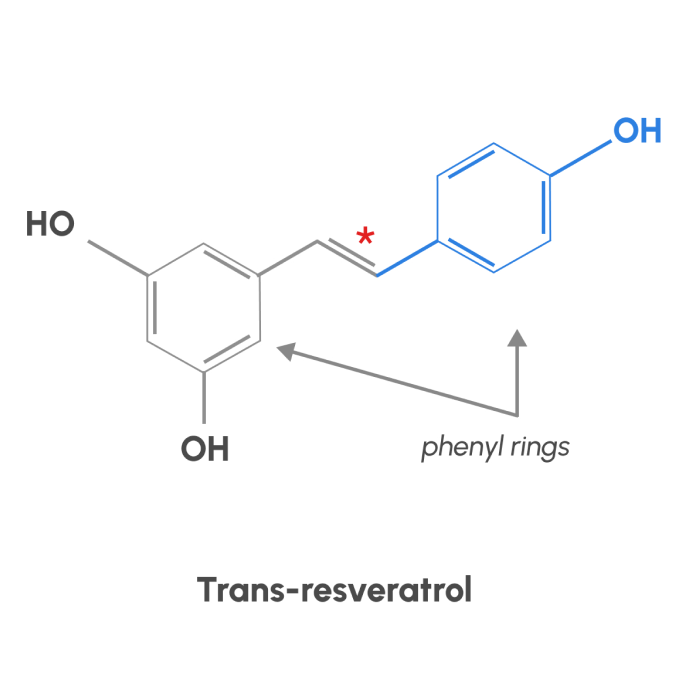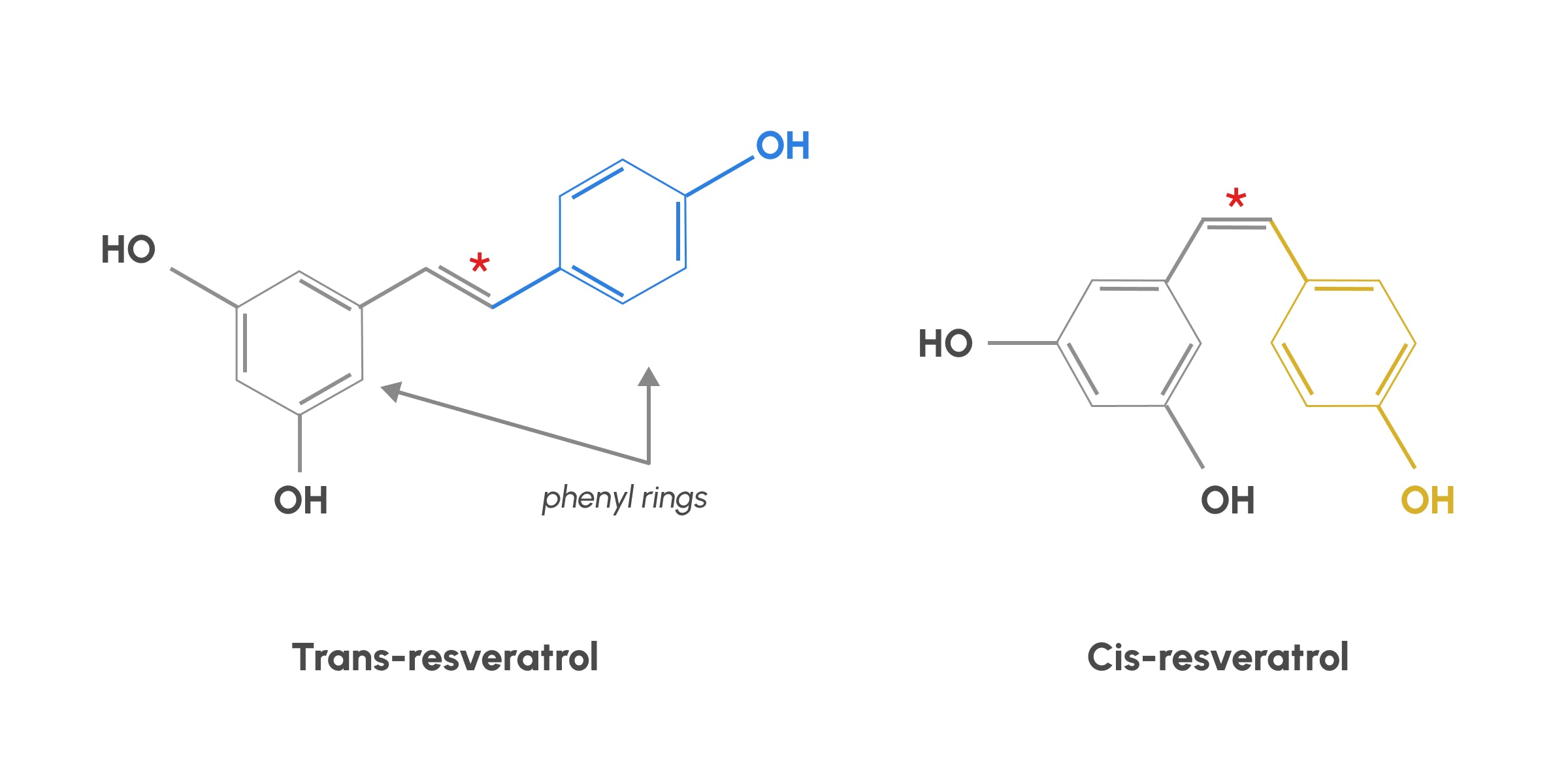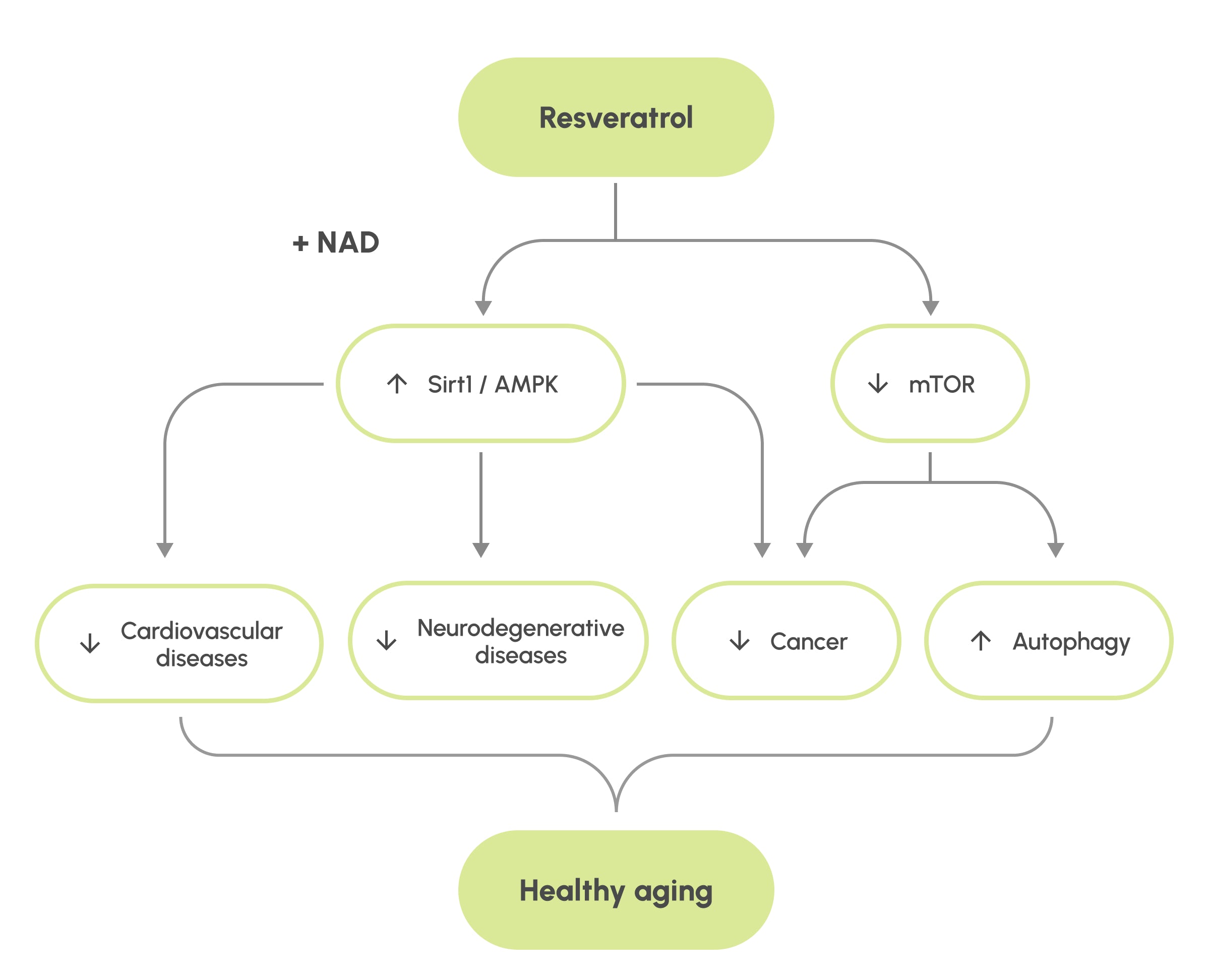Resveratrol
Resveratrol is a guardian molecule of plants. It protects them from injury and pathogen infection. It belongs to the greater family of polyphenols, like quercetin. Our diets include small quantities of resveratrol; mainly from grapes, red wine, and knotweed (1). There are two main forms of resveratrol: trans and cis. Trans-resveratrol is the most abundant, stable and biologically potent form (2). The two forms have a small difference in their 3D structure (Figure 1).
The potential benefits of resveratrol extend beyond plants to humans. A total of 191 clinical trials involving resveratrol (by itself or in combination with other compounds) are registered at clinicaltrials.gov. Out of these, 27 are still active. These potential benefits include cardiovascular, neuroprotective, anti-cancer, anti-oxidant, anti-inflammatory and pro-longevity. We see more closely some of these below.



Figure 1: Trans and cis resveratrol. Trans and cis molecules differ in the position of the phenyl rings. In the trans form, the two pheny,rings are on either side of the double bond (red asterisk). In the cis form the phenyl rings are on the same side of the bond. Trans resveratrol is more stable than cis.
Cardiovascular and metabolic benefits
The greatest part of research on resveratrol is on its cardiovascular and metabolic benefits. Several in vivo studies have shown that it can counteract a bad diet (3, 4). For example, when rhesus monkeys were on a diet high in saturated fat and glucose, resveratrol improved their aortic stiffness by up to 40 per cent (3). Thereby, it partially protected them from the deleterious effects of that diet.
In humans, resveratrol has the most striking results in patients with type 2 diabetes (T2D). There is a plethora of clinical trials in the field as well as a few meta-analysis studies (5-8). Meta-analysis studies analyze together the results of multiple clinical trials. Three meta-analysis studies confirmed that resveratrol ameliorates glucose levels, and lowers blood pressure and insulin levels in T2D patients (9-11). The ideal dose (less than 500mg or 1000mg) is still to be determined with studies showing contradictory results.

Figure 2: Potential benefits of resveratrol. Resveratrol may contribute to improvement of cardiovascular and neurodegenerative diseases; help prevent cancer and increase autophagy. Improvements in these areas contributes to healthy aging.
Neuroprotection
Another potential benefit of resveratrol is neuroprotection. Clinical studies in both healthy and Alzheimer’s Disease (AD) patients had positive outcomes. In healthy aged adults, just 200g daily was shown to improve memory (12). In AD patients, escalating doses up to 2g, reduced amyloid beta, smoothened neuroinflammation and even improved cognitive function (13).
The neuroprotective role of resveratrol stems from different qualities. It is an antioxidant that directly sequesters reactive oxygen species and enhances our own antioxidant mechanisms, like the enzyme glutathione transferase (14). It reduces inflammation by inhibiting pro-inflammatory molecules. Most importantly, it inhibits the formation of beta-amyloid aggregates and plaques, a hallmark of AD (15).
Protection from cancer
There are a lot of in vivo studies suggesting anti-cancer activities for resveratrol. In animals, it is promising for pancreatic, prostate, colorectal, liver, and breast cancer (16). Furthermore, thanks to its antioxidant and anti‐inflammatory properties, it supports an anticancer environment.
Human trials for cancer treatment are ongoing with no results available yet. Nevertheless, there are a couple of trials related to cancer prevention in healthy volunteers. In the first trial, 1-2.5g of resveratrol reduced IGF-1 (insulin-like growth factor 1), a hormone related o tumor formation and metastasis (17). In the second one, 1g of resveratrol activated detoxifying enzymes that can inhibit tumorigenesis, while it inhibited enzymes that can promote tumorigenesis (CYP enzymes) (18, 19).
A friend of longevity
Resveratrol, as mentioned before, helps plants fight injury. This means that it is also a messenger for stress. There is a theory that it also acts as a messenger for stress in humans (20). This stress is similar to the stress after exercise or calorie restriction. You may be wondering, is this a good thing? Apparently so, as exercise and calorie restriction have undoubtful benefits in longevity. Similarly, resveratrol has increased longevity in many species: yeast, worm and fish (21). This includes mice that were on a bad diet, that had 30% less risk of death (4). In healthy mammals, including humans, this is yet to be proved.
Similar to exercise and calorie restriction, resveratrol activates SIRT1, the “protein of longevity” (21). More precisely, resveratrol binds to SIRT1 and it increases its responsiveness to NAD+ (22). As a result, NAD+ is used more efficiently. So, NAD and resveratrol act synergistically and when supplemented together they can have additive benefits.
Other that the sirtuins pathway, resveratrol is also involved in the mTOR (mammalian target of rapamycin) pathway. mTOR inhibits autophagy. Resveratrol reduces the activity of mTOR resveratrol, thereby inducing autophagy. Autophagy helps clear up unwanted and potentially harmful cells and other material. It is crucial for aging and cancer (23, 24).
Can’t I just drink all the resveratrol I need in wine? It seems like the French do it…
Nice try. The French paradox may be true to an extent. According to that, although the French diet is high in saturated fat and cholesterol, French people have a low incidence of death from coronary heart disease (25). And admittedly they love their wine. Nevertheless, wine probably is not the only reason for the French paradox. Vegetable and fruit consumption and physical activity also play a role (25).
When it comes to resveratrol, a glass of red wine, depending on its origin, contains 0.3-1.8mg of resveratrol (14). Even though the ideal dose of resveratrol is not set, it can definitely not be achieved with healthy drinking.
Are there any safety concerns regarding resveratrol supplementation?
In general, resveratrol supplementation is considered safe. However, high doses above 2.5 g may cause gastrointestinal distress (17).
We mentioned earlier that resveratrol inhibits CYP enzymes which may be beneficial for tumorigenesis. However, CYP enzymes also participate in the metabolism of multiple drugs like statins, antihistamines and antiarrhythmic drugs. Inhibition of these enzymes could reduce the metabolism of these drugs. As a result, they would remain in the body for longer, with a possible risk of toxicity (18,26,27).
Conclusion
Resveratrol is a molecule with many potential benefits, mainly thanks to its antioxidant and anti-inflammatory properties. Its role in improving the markers of diabetes is established. Other potential benefits include neuroprotection, cancer prevention, and healthy aging. Ongoing clinical trials will help us know more in the future.
Note: This article is not intended to provide medical advice. If you are taking medication consult your doctor before supplementing with resveratrol.
References
1. Bohara RA, Tabassum N, Singh MP, Gigli G, Ragusa A, Leporatti S. Recent Overview of Resveratrol’s Beneficial Effects and Its Nano-Delivery Systems. Molecules 2022;27.
2. Anisimova NYU, Kiselevsky M v., Sosnov A v., Sadovnikov S v., Stankov IN, Gakh AA. Trans-, cis-, and dihydro-resveratrol: A comparative study. Chem Cent J 2011;5:1–6.
3. Mattison JA, Wang M, Bernier M, Zhang J, Park SS, Maudsley S, et al. Resveratrol prevents high fat/sucrose diet-induced central arterial wall inflammation and stiffening in nonhuman primates. Cell Metab 2014;20:183–90.
4. Baur JA, Pearson KJ, Price NL, Jamieson HA, Lerin C, Kalra A, et al. Resveratrol improves health and survival of mice on a high-calorie diet. Nature 2006 444:7117 2006;444:337–42.
5. Movahed A, Nabipour I, Lieben Louis X, Thandapilly SJ, Yu L, Kalantarhormozi M, et al. Antihyperglycemic effects of short term resveratrol supplementation in type 2 diabetic patients. Evidence-Based Complementary and Alternative Medicine 2013;2013.
6. Brasnyó P, Molnár GA, Mohás M, Markó L, Laczy B, Cseh J, et al. Resveratrol improves insulin sensitivity, reduces oxidative stress and activates the Akt pathway in type 2 diabetic patients. British Journal of Nutrition 2011;106:383–9.
7. Crandall JP, Oram V, Trandafirescu G, Reid M, Kishore P, Hawkins M, et al. Pilot Study of Resveratrol in Older Adults With Impaired Glucose Tolerance. The Journals of Gerontology: Series A 2012;67:1307–12.
8. Abdollahi S, Salehi-Abargouei A, Toupchian O, Sheikhha MH, Fallahzadeh H, Rahmanian M, et al. The Effect of Resveratrol Supplementation on Cardio-Metabolic Risk Factors in Patients with Type 2 Diabetes: A Randomized, Double-Blind Controlled Trial. Phytotherapy Research 2019;33:3153–62.
9. Liu K, Zhou R, Wang B, Mi MT. Effect of resveratrol on glucose control and insulin sensitivity: a meta-analysis of 11 randomized controlled trials. Am J Clin Nutr 2014;99:1510–9.
10. García-Martínez BI, Ruiz-Ramos M, Pedraza-Chaverri J, Santiago-Osorio E, Mendoza-Núñez VM. Hypoglycemic Effect of Resveratrol: A Systematic Review and Meta-Analysis. Antioxidants 2021;10:69.
11. Nyambuya TM, Nkambule BB, Mazibuko-Mbeje SE, Mxinwa V, Mokgalaboni K, Orlando P, et al. A Meta-Analysis of the Impact of Resveratrol Supplementation on Markers of Renal Function and Blood Pressure in Type 2 Diabetic Patients on Hypoglycemic Therapy. Molecules 2020;25:5645.
12. Veronica Witte A, Kerti L, Margulies DS, Flöel A. Effects of Resveratrol on Memory Performance, Hippocampal Functional Connectivity, and Glucose Metabolism in Healthy Older Adults. Journal of Neuroscience 2014;34:7862–70.
13. Moussa C, Hebron M, Huang X, Ahn J, Rissman RA, Aisen PS, et al. Resveratrol regulates neuro-inflammation and induces adaptive immunity in Alzheimer’s disease. J Neuroinflammation 2017;14:1–10.
14. Khattar S, Khan SA, Zaidi SAA, Darvishikolour M, Farooq U, Naseef PP, et al. Resveratrol from Dietary Supplement to a Drug Candidate: An Assessment of Potential. Pharmaceuticals 2022;15:957.
15. Rege SD, Geetha T, Griffin GD, Broderick TL, Babu JR. Neuroprotective effects of resveratrol in Alzheimer disease pathology. Front Aging Neurosci 2014;6:1–27.
16. Carter LG, D’Orazio JA, Pearson KJ. Resveratrol and cancer: focus on in vivo evidence. Endocr Relat Cancer 2014;21:R209–25.
17. Brown VA, Patel KR, Viskaduraki M, Crowell JA, Perloff M, Booth TD, et al. Repeat dose study of the cancer chemopreventive agent resveratrol in healthy volunteers: Safety, pharmacokinetics, and effect on the insulin-like growth factor axis. Cancer Res 2010;70:9003–11.
18. Chow HHS, Garland LL, Hsu CH, Vining DR, Chew WM, Miller JA, et al. Resveratrol modulates drug- and carcinogen-metabolizing enzymes in a healthy volunteer study. Cancer Prevention Research 2010;3:1168–75.
19. Guthrie AR, Chow HHS, Martinez JA. Effects of resveratrol on drug‐ and carcinogen‐metabolizing enzymes, implications for cancer prevention. Pharmacol Res Perspect 2017;5:294.
20. Hooper PL, Hooper PL, Tytell M, Vígh L. Xenohormesis: health benefits from an eon of plant stress response evolution. Cell Stress Chaperones 2010;15:761.
21. Bhullar KS, Hubbard BP. Lifespan and healthspan extension by resveratrol. Biochimica et Biophysica Acta (BBA) – Molecular Basis of Disease 2015;1852:1209–18.
22. Gertz M, Nguyen GTT, Fischer F, Suenkel B, Schlicker C, Fränzel B, et al. A Molecular Mechanism for Direct Sirtuin Activation by Resveratrol. PLoS One 2012;7:e49761.
23. Park D, Jeong H, Lee MN, Koh A, Kwon O, Yang YR, et al. Resveratrol induces autophagy by directly inhibiting mTOR through ATP competition. Scientific Reports 2016 6:1 2016;6:1–11.
24. Nakamura S, Yoshimori T. Autophagy and Longevity. Mol Cells 2018;41:65–72.
25. Ferrières J. The French paradox: lessons for other countries. Heart 2004;90:107.
26. Detampel P, Beck M, Krähenbühl S, Huwyler J. Drug interaction potential of resveratrol.
27. Hyrsova L, Vanduchova A, Dusek J, Smutny T, Carazo A, Maresova V, et al. Trans-resveratrol, but not other natural stilbenes occurring in food, carries the risk of drug-food interaction via inhibition of cytochrome P450 enzymes or interaction with xenosensor receptors. Toxicol Lett 2019;300:81–91.
Resveratrol Quality Reports
All of our product has been manufactured in a US-based, FDA, GMP, and NSF registered facility under strict GMP standards, and third-party lab tested.